I'm building a simplified Blockchain app.
I built my own iterator, and it works.
Here is my code:
# ---------- DEPENDENCIES AND OTHERS ----------
import datetime
blockchains = []
n = 0
# ---------- BLOCK CLASS ----------
class Block:
def __init__(self, sender, money, receiver, previous_block=None):
self.time = datetime.datetime.now()
self.sender = sender
self.money = money
self.receiver = receiver
self.previous_block = previous_block
def __repr__(self):
return f"""> NEW BLOCK:
Time: {self.time}
Sender: {self.sender}
Money: {self.money}
Receiver: {self.receiver}
"""
# ----------BLOCKCHAIN CLASS ----------
class Blockchain:
def __init__(self):
# Set "Tail Block" default as none. This will help identify if Blockchain is empty or not.
self.tail_block = None
# Check if there are any existing blockchains
if not blockchains:
self.name = input("Insert New Blockchain Name: ")
blockchains.append(self)
else:
# Cycle to ensure new Blockchain has a unique name.
valid_name = False
while not valid_name:
name = input("Insert New Blockchain Name: ")
print()
if any(blockchain.name == name for blockchain in blockchains):
print("Name already in use.\n")
else:
valid_name = True
self.name = name
blockchains.append(self)
def __iter__(self):
return self
def __next__(self):
# If Blockchain is empty:
if not self.tail_block:
raise StopIteration
# If Blockchain is not empty:
else:
""" 'n' counts what iteration of "__next__()" the program is in.
Or in other words, how many times the "__next__()" function has been run."""
global n
n += 1
# If it's the first "__next__()" iteration:
if n == 1:
return self.tail_block
# If it's after the first "__next__()" iteration:
else:
current_block = self.tail_block
for i in range(n-1):
current_block = current_block.previous_block
if not current_block:
raise StopIteration
else:
return current_block
def __repr__(self):
return f"{self.name}"
def add_block(self, new_block_sender, new_block_money, new_block_receiver):
# Check to see if Blockchain is empty
if not self.tail_block:
new_block = Block(new_block_sender, new_block_money, new_block_receiver)
# If it's not empty, the new block's "previous block" will be the existing "tail block"
else:
new_block = Block(new_block_sender, new_block_money, new_block_receiver, self.tail_block)
# Update "Tail Block" to the newly created block
self.tail_block = new_block
def view(self):
if not self.tail_block:
print("There are no Blocks in this Blockchain.\n")
else:
current_block = self.tail_block
while True:
print(current_block)
if not current_block.previous_block:
break
else:
current_block = current_block.previous_block
# ---------- TESTS ----------
# Testing my iterator with an empty Blockchain:
blockchain_1 = Blockchain()
for block in blockchain_1:
print(block)
# Testing my iterator with non empty Blockchain:
blockchain_2 = Blockchain()
blockchain_2.add_block("António", 200000, "Tim")
blockchain_2.add_block("António", 100000, "Bob")
blockchain_2.add_block("António", 50000, "John")
blockchain_2.add_block("António", 50000, "Bill")
for block in blockchain_2:
print(block)
In my iterator, there's a variable called n.
I declare n right at the beginning of the program with n = 0 to make it a global variable.
So, since n a global variable, I just increment it inside my __next__() method with the code: n += 1.
However, when I do that, I get an UnboundLocalError:

After experimenting, I found that if I type global n above n +=1 it fixes it:
 But why?
But why?
Since I declared n = 0 at the beginning of the program, shouldn't n already be a global variable?
Why do I have to "re-global" n to make this work, when n was already supposed to be global in the first place?